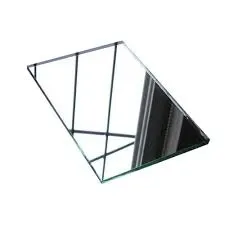

The Allure and Versatility of Mirror Float Glass
Mirror float glass, a sleek and highly polished material, embodies a unique intersection of functionality and aesthetics. Widely used in both commercial and residential environments, it enhances spaces not only by providing reflective surfaces but also by improving the perception of space, light, and design. Understanding more about mirror float glass unleashes its potential for various applications, from mirrors in bathrooms to reflective facades in modern architecture.
What is Mirror Float Glass?
Mirror float glass is manufactured through the float glass process, which involves melting raw materials such as silica sand, soda ash, and limestone. This mixture is heated to extreme temperatures, resulting in molten glass. The critical innovation of the float glass method is that the molten glass is poured onto a layer of molten tin, allowing it to spread out evenly and form a smooth, flat surface. Once cooled, the glass is cut and polished to achieve the ultra-smooth finish required for mirrors.
The reflective quality of mirror float glass is achieved by applying a metallic coating—usually made from silver or aluminum—on one side. This coating is what allows the glass to reflect light, creating the mirror effect we associate with everyday life. The combination of its manufacturing process and reflective properties makes mirror float glass an ideal choice for various applications.
Applications of Mirror Float Glass
The uses of mirror float glass are diverse and expansive, influencing several fields
1. Architecture and Interior Design In contemporary architecture, mirror float glass is frequently used in building facades. Its reflective quality helps modern buildings to blend into their surroundings, reducing the visual impact of large structures. In interior design, mirrored walls create an illusion of space, making smaller rooms appear larger and more open.
2. Furniture The trend of incorporating mirror float glass into furniture designs is gaining popularity. From coffee tables with mirrored tops to sleek, reflective cabinets, it adds a touch of elegance and sophistication to home decor.
3. Art and Design Artists and designers often use mirror float glass to create installations that play with perceptions of space and light. By manipulating reflections and angles, they challenge viewers' perceptions and create interactive experiences.

4. Automotive Applications In the automotive industry, mirror float glass is used in vehicles for rear-view mirrors and panoramic windows, enhancing both functionality and design.
5. Bathroom and Mirrors The most familiar application of mirror float glass is in personal grooming mirrors found in bathrooms. Its clarity and high reflectivity provide a crucial utility for daily routines.
Benefits of Mirror Float Glass
The appeal of mirror float glass can be attributed to several key benefits
- Aesthetic Appeal The sleek and polished finish of mirror float glass adds a touch of elegance to any environment. It can amplify light and enhance colors, making spaces feel more vibrant.
- Durability Designed to withstand wear and tear, mirror float glass is a robust material resistant to breakage and scratches.
- Versatility Mirror float glass can be cut and molded into various shapes and sizes, making it suitable for an array of design applications ranging from minimalist decor to extravagant art pieces.
- Energy Efficiency Reflective surfaces can contribute to energy efficiency in buildings by reducing the need for artificial lighting, fostering a more sustainable approach to architecture.
Conclusion
Mirror float glass serves as more than just a reflective surface; it is a transformative material that reshapes our environments. Its applications span from practical uses in everyday life to artistic explorations, allowing it to find a place in various facets of design and architecture. As we continue to seek innovative solutions in style and sustainability, the role of mirror float glass will undoubtedly remain significant, illuminating our spaces in ways we once only dreamed of.